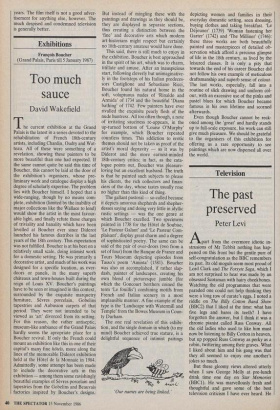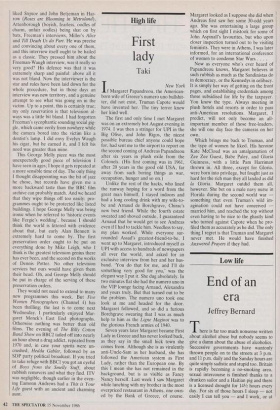Television
The past preserved
Peter Levi
Apart from the evermore idiotic in- strusions of Mr Tebbit nothing has hap- pened on this front but the gentle purr of self-congratulation as the BBC remembers its past. Its old moguls seem most proud of Lord Clark and The Forsyte Saga, which I am not surprised to hear was made by an obsessed Scotsman with hairy cheekbones. Watching the old programmes that were paraded one could not help thinking they were a long row of curate's eggs. I noted a riddle on The Billy Cotton Band Show (BBC2) that I liked at the time: what has five legs and bares its teeth? I have forgotten the answer, but I think it was a chronic pianist called Russ Conway. All the old ladies who used to like him must now be listening to Billy Cotton in heaven, but up popped Russ Conway as perky as a robin, twittering among their graves. What I liked about him and his gang was that they all seemed to enjoy one another's jokes so much.
But these gloomy views altered utterly when I saw George Melly at pre-lunch drink time one day on Star Memories (BBC1). He was marvellously fresh and thoughtful and gave some of the best television criticism I have ever heard. He liked Steptoe and John Betjeman in Har- row (Roses are Blooming in Metroland), Attenborough (boyish, fearless, oodles of charm, unfair oodles) being shat on by bats, Freeman's interviews, Miller's Alice and Till Death Us do Part. He was precise and convincing about every one of them, and this interview itself ought to be hailed as a classic. They pressed him about the Freeman-Waugh interview, was it really so very good? His defence was that it was extremely sharp and painful: above all it was not bland. Now the interviewer is the star and rules have been laid down for the whole procedure, but in those days an interview was new territory, and a genuine attempt to see what was going on in the victim. Up to a point, this is certainly true; my only reservation is that television al- ways was a little bit bland. I had forgotten Freeman's sycophantic sound* social gig- gle, which came eerily from nowhere while the camera bored into the victim like a dentist's lamp. I did envy Evelyn Waugh his cigar, but he earned it, and I felt his need was greater than mine.
This George Melly piece was the most unexpectedly good piece of television I have seen in ages; I hope it gets repeated at a more sensible time of day. The only thing I thought disappointing was the bit of jazz he chose, but records have given me a more backward taste than the BBC film archive can probably match. And we heard that they wipe things off too easily: pro- grammes ought to be protected like listed buildings. I hope George Melly was being ironic when he referred to 'historic events like Fergie's wedding', because I should think the world is littered with evidence about that, but early Alan Bennett is extremely hard to come by. The first preservation order ought to be put on everything done by Mike Leigh, who I think is the greatest television genius there has ever been, and the second on the works of Dennis Potter. No other television services but ours would have given them their head. Oh, and George Melly should be put in charge of the serving of these preservation orders.
They would not need to extend to many new programmes this week. But Five Women Photographers (Channel 4) has been thrilling; the last is to come next Wednesday. I particularly enjoyed Mar- garet Monck's East End photographs. Otherwise nothing was better than old films. The evening of The Billy Cotton Band Show on BBC2 tailed off into nearly an hour about a drug addict, repeated from 1970 and, in case your spirits were un- crushed, Hedda Gabler, followed by an SDP party political broadcast. If you tried to take refuge with BBC1 you got an eyeful of Boys from the Smelly Stuff, about rubbish removers and what they find. ITV was negligible, though earlier in the even- ing Eamonn Andrews had a This is Your Life guest with an ancient and charming aunt.



































































 Previous page
Previous page